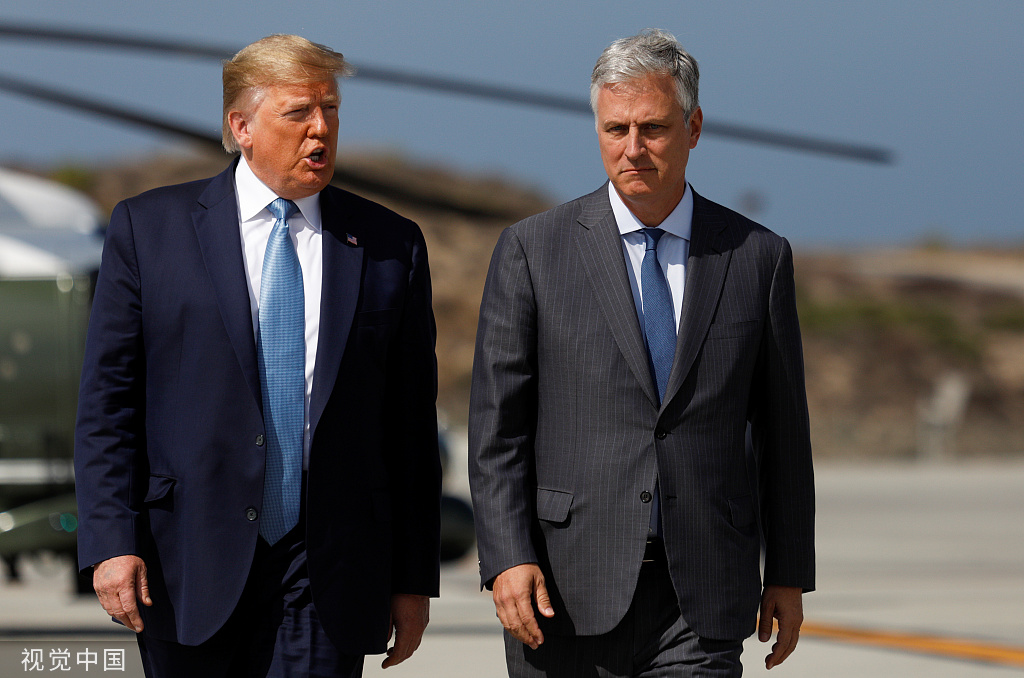New security advisor, same old American policies
- By Mitchell Blatt
 0 Comment(s)
0 Comment(s) Print
Print E-mail China.org.cn, September 23, 2019
E-mail China.org.cn, September 23, 2019

A new face as National Security Advisor at the White House does not apparently signal a change in the U.S. strategy towards Iran. Within days of the new advisor, Robert O'Brien, being sworn into office, President Donald Trump announced a dispatch of troops to Saudi Arabia directed at Iran.
A shift in personnel, no matter how key the position is, is not going to change the underlying circumstances that created the original conflict. The fact is that O'Brien's ideology is very much in line with his predecessor, John R. Bolton.
O'Brien, in fact, previously worked under Bolton, while the latter was the U.N. Ambassador 2005-06. When Bolton was nominated to the NSA post in 2018, O'Brien was quite supportive of the choice.
In an interview with conservative radio host Hugh Hewitt, he even defended Bolton's fiery demeanor: "This whole idea that John is a bomb thrower, or, you know, abrasive and that sort of thing, just isn't true."
O'Brien also mentioned in the same interview that he felt the Iran nuclear deal, as previously negotiated, was too favorable to Iran, a point on which Bolton and Trump agreed when the U.S. withdrew from it.
In 2015, O'Brien had declared: "I think I'm a pretty strong advocate of a robust American military, of American leadership in the world."
As an analysis in the political magazine Politico puts it: "O'Brien represents a stylistic – but not necessarily an ideological – shift from the man he is replacing."
The dispatch of additional troops to the Middle East is a serious escalation in terms of rhetoric but not necessarily in terms of facts on the ground. The United States already has more than 60,000 personnel stationed in the region, so an additional 500 to be sent to Saudi Arabia is not much of an expansion.
However, the announcement was meant to make the U.S. – and Trump – look tough on both the global and domestic stage. Trump doesn't really dare to go to war, but he wants to appear to be doing something.
He also announced what he called the "highest sanctions ever" on Iran's central bank. Again, the tough talk is meant to send a message, but it does not represent much of a change in reality. The U.S. is already imposing extreme sanctions on Iran, including dollar-based transactions. There are almost no legal transactions left to target.
To the extent that the new sanctions do put any pressure on Iran, the predictable outcome is that it will not let up its combative responses. (Iran denied responsibility for the attack on the Saudi oil fields as claimed in Riyadh and Washington, but it has admitted to other strikes against American interests and the regional oil infrastructure).
It was the U.S. imposition of sanctions in the first place that led to Iran's growing forcefulness. Feeling it was being backed into a corner, Iran has reacted in a way it feels necessary to protect its interests.
Trump faces a dilemma. He campaigned as an anti-interventionist who would focus on America "first," but he also campaigned as a tough man who would defend America against any slight. He would talk tough, threatening, memorably, to deliver "fire and fury" to the Democratic People's Republic of Korea (DPRK).
Ultimately no such conflict came to pass, and the DPRK came to the bargaining table – although the bargaining has made little progress.
Now, Trump has shot his mouth off similarly about Iran. In May he threatened "the end of Iran." A similar pattern has emerged. All talk and no action. All fury and no fire.
In June, he announced he canceled a planned strike on Iran shortly before it was due to be launched. At the time he said America was "cocked and loaded" and made threats should Iran take any more actions hostile to the U.S.
He then used similar language after the initial reports of the attack on Saudi Arabia. "There is reason to believe that we know the culprit, and are locked and loaded depending on verification," he tweeted.
Yet again, no military action was taken – his threats were empty. Iran and every other country in the world recognize the pattern, and Iran is not likely to heed further American threats.
Now, after many threats on which Trump never followed through, there is little hint of unpredictability left.
By sending troops to Saudi Arabia, Trump can take low-risk actions to respond, appearing to at least partially satisfy his threats while not jumping directly into a costly (both politically and in terms of human lives) war. The danger is that there may still be an invisible red line somewhere, a line that neither side can see, and each escalation brings both sides ever so closer to crossing into the abyss.
Mitchell Blatt is a columnist with China.org.cn. For more information please visit:
http://www.china.org.cn/opinion/MitchellBlatt.htm
Opinion articles reflect the views of their authors, not necessarily those of China.org.cn.
If you would like to contribute, please contact us at opinion@china.org.cn.






Go to Forum >>0 Comment(s)